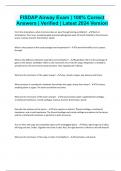FISDAP Airway Exam | 100% Correct Answers | Verified | Latest 2024 Version From the atmosphere, what structures does air pass through during ventilation? - ✔✔Starts in atmosphere, then nose, nasopharyngeal space/orophargyneal space (if mouth breather), then pharynx, larynx, trachea, bronchi, bronchioles, alveoli What is the purpose of the nasal passages and nasopharynx? - ✔✔To warm/humidify air as it passes through What is the difference between respiration and ventilation? - ✔✔Respiration refers to the exchange of gases in the alveoli, ventilation refers to the movement of air into the lungs. Respiration is needed to provide O2 to cells and remove waste products. Also regulates pH of blood. What are the structures of the upper airway? - ✔✔nose, mouth, tongue, jaw, pharynx and larynx What structure is considered a landmark that divides the upper airway from lower? - ✔✔The larynx, anything above is upper. The larynx and below are lower. What are the structures of the lower airways? - ✔✔larynx (includes adam's apple/thyroid cartilage, cricothyroid membrane, cricoid cartilage), trachea, bronchi, bronchioles, alveoli Describe the anatomy of the larynx. - ✔✔From superior to inferior. Thyroid cartilage, cricothyroid membrane, and cricoid membrane. The thyroid cartilage and cricoid cartilage are anterior to the larynx, and the cricothyroid membrane is posterior to both structures. True or false: the lungs are completely equal in the midsaggital plane. - ✔✔False, right lungs has 3 lobes, left lung only has 2 lobes. Together they have 5 total. Also, the right bronchi is inferior to the left bronchi. What are the structures of the lungs in order of ventilation? - ✔✔bronchioles, and alveoli True or false: the lungs use muscles found in the lateral lobes to expand and contract? - ✔✔False: the lungs are hollow organs and contain no muscles. When the diaphragm contracts it expands the thoracic cavity. The pleural space has a negative pressure and the lungs expand. This results in a slightly negative pressure (compared to the atmosphere ) and air rushes in. True or false: Air rushes into the lungs because of negative pressure. - ✔✔True, when the lungs expand, they are creating a vacuum because they are expanding the volume of the container. This increase in volume causes influx of air into the container until the pressure is equalized with the atmosphere. True or false: The parietal pleura lines the lungs and the visceral pleura lines the lungs. The space between is called the anterior pleura. - ✔✔False: the visceral pleura lines the lungs, the parietal pleura lines the body cavity and the pleural space is the space in between both where body fluid allows for both to smoothly glide. What muscles are involved in inhalation? - ✔✔The diaphragm, cervical muscles (neck), intercostals, abdominal muscles, and pectoral muscles. What muscles are involved in expiration? - ✔✔none, expiration (if done passively) is achieved by the relaxation of the diaphragm. What is the primary driver of respiration? (Why would we increase/decrease RR?) - ✔✔The CSF in the brain has chemoreceptors sensitive to CO2. When there is too much CO2. The pH changes. These sensors feed back to the medulla oblongata, which stimulates the phrenic nerve which innervates the diaphragm. They cause an increase in activity of the diaphragm. This increases the RR which causes us to increase tidal volume. This means more CO2 is exhaled. And brings our pH back to normal. We also have the less sensitive hypoxic drive What is hypoxic drive? - ✔✔Backup system to control respiration. Chemoreceptors in brain, aorta, and carotid arteries. But they are "satisfied" by a small amount of O2, which means it is not as sensitive as pH control of CO2 What two areas of the brain are involved in respiration? - ✔✔medulla -controls rhythm, initiates inspiration, sets base pattern for respirations, and stimulates diaphragm to contract. pons -changes depth of inspiration, expiration or both. True or false: arteries bring oxygenated blood to organs/capillaries - ✔✔True in most cases with one exception. Arteries (away) bring blood away from the heart. Usually this is oxygenated blood. But the pulmonary arteries bring oxygen poor blood away from the heart, to the lungs to be oxygenated. What is the tidal volume? - ✔✔amount of air moved in/out of lungs in single breath. Usually 500 ml in adult What is inspiratory reserve volume? - ✔✔Deepest breath you can take after normal respiration What is expiratory reserve volume/Vital Capacity? - ✔✔maximum amount you can breathe out after normal breath. What is residual volume? - ✔✔Remaining gas in lungs after exhalation. This is to keep lungs inflated What is dead space? What structures are considered part of dead space? - ✔✔Part of respiratory system not involved in active respiration. Air moves through here but little to no respiration occurs. Mouth, trachea, bronchi and bronchioles considered dead space What is minute volume? What does it measure? - ✔✔Minute volume = RR x tidal volume. Volume of air moving through lungs in 1 minute. Can be estimated quickly. Count RR rate. If normal check to see chest rise and fall (tidal volume). If chest rise and fall is weak and/or little air coming out of nose, then the person has small minute volume. Alveolar Minute Volume - ✔✔Volume of air moved through lungs in 1 minute minus the dead space. Alveolar Minute Volume = (tidal volume - dead space) x RR Alveolar Ventilation - ✔✔Volume of air that reaches alveoli. Alveolar ventilation = tidal volume - dead space




